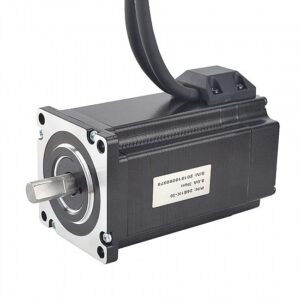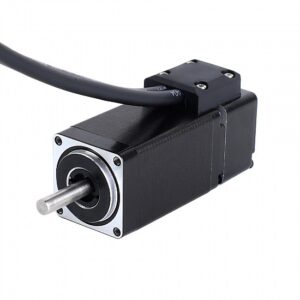Title: Navigating CNC Stepper Motors: A Comprehensive Guide
 CNC stepper motors are specialized electric motors crafted for the intricate demands of CNC (computer numerical control) machines. This guide delves into the essentials of CNC stepper motors, explores the technology behind them, and sheds light on their variations, advantages, and applications.
CNC stepper motors are specialized electric motors crafted for the intricate demands of CNC (computer numerical control) machines. This guide delves into the essentials of CNC stepper motors, explores the technology behind them, and sheds light on their variations, advantages, and applications.
1. Understanding CNC Stepper Motors
CNC stepper motors, designed to convert electrical signals into precise mechanical movements, play a crucial role in the operation of CNC machines. Renowned for their high torque, low speed, and precise positioning accuracy, these motors are the backbone of many precision-driven applications.
Online Stepper, a prominent manufacturer, stands out for its extensive range, offering NEMA 17, NEMA 23, and NEMA 34 motors. Recognized for quality and reliability, Online Stepper motors power diverse CNC applications.
Explore CNC stepper motors at Online Stepper
2. The Technology Behind Stepper Motors
Stepper motors operate on the principle of electromagnetism. When an electric current passes through a coil of wire wrapped around a permanent magnet, a magnetic field is created, inducing controlled rotation. By strategically switching the current on and off, stepper motors move in precise increments, ensuring accuracy in CNC applications.
3. Types of CNC Stepper Motors
a. Bipolar Stepper Motors: Feature two coils of wire, offering enhanced power and accuracy.
b. Unipolar Stepper Motors: Employ a single coil of wire, providing simplicity and cost-effectiveness.
4. Stepper Motors vs. Servo Motors
Choosing between stepper and servo motors is pivotal for CNC applications. While stepper motors offer simplicity and reliability, servo motors, with their closed-loop control system, deliver superior accuracy, responsiveness, and are less prone to step losses.
- Closed-Loop Stepper Motors: Combining precision and closed-loop feedback, these motors enhance performance, addressing open-loop stepper limitations.
5. Exploring Microstepping
Microstepping, a technique to refine CNC stepper motor resolution, divides a full step into smaller increments. While it improves motion smoothness and reduces vibration, it introduces complexity, increased costs, and potential noise.
Learn more about microstepping benefits

6. NEMA Motors Demystified: 17, 23, and 24
NEMA motors, categorized by size and mounting dimensions, include NEMA 17, NEMA 23, and NEMA 24.
a. NEMA 17: Suited for space-sensitive applications like 3D printing, small CNC machines, and robotics, prioritizing precision.
b. NEMA 23: Balancing size and torque, ideal for larger CNC machines, automation, and various industrial systems.
c. NEMA 24: Powerhouse in industrial settings, excelling in high-torque applications such as large CNC machines and heavy-duty robotics.
7. Advantages and Disadvantages
Advantages:
- High torque
- Low speed
- Precise positioning accuracy
- Simplicity and reliability
- Affordability
Disadvantages:
- Limited speed
- Not suitable for continuous operation
- Can be noisy
8. Conclusion
In conclusion, CNC stepper motors offer versatility and reliability crucial for CNC machines. Online Stepper, a trusted manufacturer, provides a diverse range of high-quality motors. This comprehensive guide aims to empower users in understanding, selecting, and optimizing CNC stepper motors for their specific applications.
We trust this guide has been informative. Should you have further questions or require assistance, please do not hesitate to reach out.